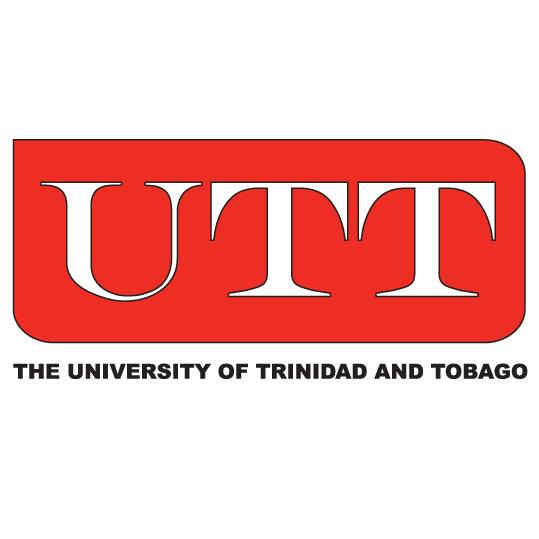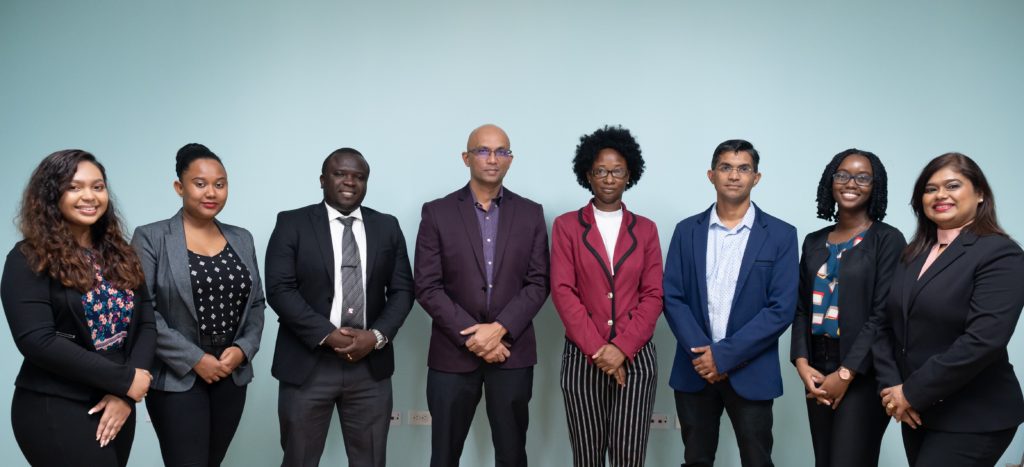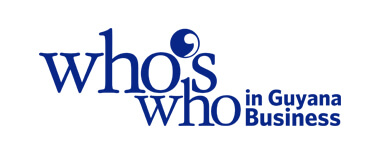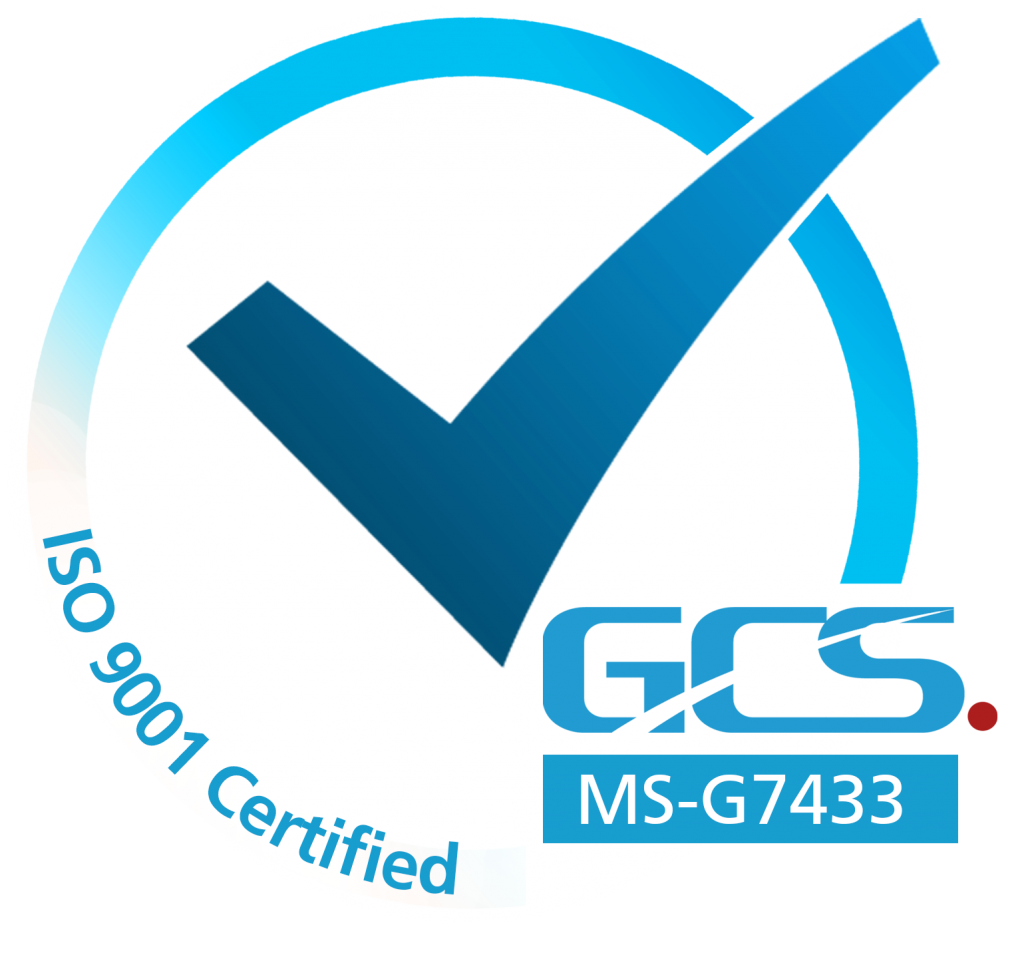The University of Trinidad and Tobago
UTT partners with ActionINVEST Caribbean Inc.

The University of Trinidad and Tobago (UTT) recently signed a Memorandum of Understanding (MoU) with ACTIONInvest Caribbean Inc (ACI). This signing formalises the relationship between the two institutions.
This MoU will realise the collaboration of UTT and ACI to support national and regional social and economic development, through Social Responsibility initiatives aligned to the strategic goals of both parties, mainly in the area of Human Resources. It will also create opportunities for students and graduates through internships in various fields relative to their area of study. Overall, this partnership will support and promote continuous professional development of staff at UTT, and facilitate the transfer of knowledge between the institutions, and by extension, students and graduates of the University.


This MoU will realise the collaboration of UTT and ACI to support national and regional social and economic development, through Social Responsibility initiatives aligned to the strategic goals of both parties, mainly in the area of Human Resources. It will also create opportunities for students and graduates through internships in various fields relative to their area of study. Overall, this partnership will support and promote continuous professional development of staff at UTT, and facilitate the transfer of knowledge between the institutions, and by extension, students and graduates of the University.
Together, The University of Trinidad and Tobago and ACTIONInvest Caribbean Inc. are both committed to solidifying already existing bonds, and to providing support to the wider Caribbean especially in the areas of professional and organisational growth.
COURSES (SAFETY)
A good health and safety record is a competitive advantage and a reflection of management strength. By auditing current performance, informed decisions can be made, actions prioritized and resources allocated. This course provides the knowledge and skills necessary to carry out audits of an organisation’s occupational health and safety systems against defined audit standards (32 Hours).
This course looks at accident investigation as a means to prevent injuries, property damage and financial loss. It will allow participants to understand how to conduct an investigation from the examination of the scene to submitting the report (16 Hours).
This course seeks to provide the basis for training and certifying new arrivals at industrial and construction sites in the fundamentals of occupational safety and health. It provides general information on workplace safety and details how employees should conduct themselves on site. This is a general industrial site orientation and is intended to complement any site-specific orientation at the respective industrial and/or construction site (16 Hours).
Electrical Safety Training
Emergency Response Management – Incident Command System
Fall Prevention and Protection
Fundamentals of Industrial Hygiene
Gas and Hydrocarbon Pipeline Emergency
Managing Risks in the Oil and Gas Industry
OSHA 10 HR General Industries
OSHA 30 HR General Industries
Permit Required Confined Space Entry
Safe Operating Procedures
Innovate Root Cause Analysis
Development Of a Crisis and Emergency Response Philosophy/Framework (C&CMER)
Planning and Implementation of Systems for Major Accident Hazards
This course is designed to educate participants on the risks associated with electricity. Participants will learn the means of protection from the electrical hazards associated with risks. They will also learn of the dangers of electricity, the importance of grounding and the uses of Personal Protective Equipment (PPE), when using electrical equipment or operating on electrical systems (24 Hours).
This course is designed to train individuals in the skills necessary to effectively plan for, respond to and manage major accident risks and other emergencies by applying and implementing an all-hazard, multi-disciplinary, command and structured approach as described in the Incident Command System (ICS). This includes the development of an Emergency Management Group and Emergency Operation Center with specific emphasis on incident planning, communication network, interagency operations and resource management processes (16 Hours).
This course will educate participants on the rules and regulations as outlined by OSHA for working safely on elevated workstations on Construction Sites and Industrial Plants. Workers will learn the protection systems and methods for elevated work, inspection and maintenance procedures for fall protection devices. Additionally, participants will learn the requirements for Scaffolding as a Fall Protection Device. Participants will be able to identify the proper procedures for erecting, dismantling and inspecting scaffolds (16 Hours).
This course is designed to give participants information and knowledge in anticipating, recognising, evaluating and controlling workplace conditions that may cause workers’ injury or illness. Participants will understand the use of environmental monitoring and analytical methods to detect the extent of worker exposure and how engineering, work practice control and other methods to control potential health hazards are employed (8 Hours).
The gas and hydrocarbon pipeline emergency course covers an extensive view of underground and aboveground pipelines, which transports natural gas, and liquids in a safe and relatively economical mode of transportation. It focuses on how to respond safely and effectively to pipeline incidents and emergencies (16 Hours).
The course covers the fundamental aspects of risk management but specifically tailored for the oil and gas sector. You will learn about the theory and practice of risk management at an enterprise and project level, focusing on oil and gas case studies such as; oil price, working in unstable environments, managing projects portfolios and supply chain (24 Hours).
The OSHA 10 Hour General Industries Course allows employers and employees to avoid the challenges associated with non-compliance of the OSH Act. Knowledge gained from this course will result in increased workplace safety awareness and compliance which will further reduce the risk of penalties and fines resulting from OSHA violations (10 Hours).
The OSHA 30 Hour General Industries Course train and educate employers and employees to recognize, rectify, prevent and avoid unsafe and unhealthy working conditions. This course allows employers and employees to avoid the challenges associated with non-compliance of the OSHA Act. Knowledge gained from this course will reduce the risk of penalties and fines resulting from OSHA violations (30 Hours)
The objective of this course is to provide information to educate participants on safety requirements and procedures for Confined Space Entry and Work (8 Hours).
This course provides practical guidance for developing safe operating procedures for selected operations in the manufacturing and construction sector. Topics in this course include: Confined Space Entry, Hand & Power Tools, Electrical Safety, Fall Prevention and Protection and Materials Handling (16 Hours.)
To maximize reliability and availability of assets against minimum costs, problems must be resolved quickly and effectively and future occurrences must be prevented in the future. However, in everyday practice, “jumping to conclusions”, “trial and error” and “jumping to solutions” are well known pitfalls.
This course is designed to equip participants with the knowledge and skills to identify, describe, analyse, solve and prevent all problems, regardless the complexity (24 Hours).
Participants of this course will be able to understand the operating framework of a C&CMER System, develop a philosophy/strategy with a focus on a management system aligned with ISO 22361, “Guidance on crisis management to help organizations plan, establish, maintain, review, and continually improve a strategic crisis management capability (24 Hours).
Upon completion, the participants of this course, will be able to understand the importance of planning for major accident hazards, aimed at reducing the potential for escalation, ensuring the appropriateness of resources, and establishing operational and tactical plans to address them (24 Hours).
COURSES (PETROLEUM BUSINESS/OTHER)
This course provides a practical understanding of the basics of Petroleum Technology targeting non-technical personnel and managers. The course is presented in an interesting, effective, and efficient manner and included are the basics of the industry exploring for petroleum to preparation of the petroleum product for sales (40 Hours).
This course will provide the fundamentals to understanding the basic economic analysis and profitability of petroleum exploration and production Budgeting and financing, accounting, and contractual arrangements, which also significantly impact the economic viability of a project, are covered. Participants will benefit from taking this course if they have no previous experience in the how and why of project economics, how project sanction and funding decisions are made and understanding oil and gas project decision making (40 Hours).
With increasing emphasis being placed on achieving greater results while minimizing costs and effort, project management has taken on a very significant role. One of the key functions in the management of a project is the deployment of the necessary human and financial resources in order to achieve specific objectives within time, cost and quality parameters.
This course will focus on approaches to Project Management, Planning, Financing and Evaluation. It will also look at Project Management as it relates to the Management of the Change Process. (40 Hours).
This training course has been specifically designed to develop the competency of personnel in the warehouse, inventory and logistics functions of an organization by improving their skills, knowledge and understanding (24 Hours).
Successful grant proposals are those that have been researched and specifically targeted to each respective funder. This course provides students with the opportunity to critically examine the granting process. Participants investigate and practice grant research strategies, and explore methods for building relationships with potential grant funders. Students apply fundamental elements of effective proposal writing in response to grant applications, and discuss evaluation of the proposal writing process (24 Hours).
Standard Operating Procedure (SOP) is a set of written instructions that shows how to perform a routine activity in an organisation. The development and use of SOPs form an integral part of any successful quality system. This course will walk participants through the process of writing standard operating procedures (SOPs) for their organisations. Participants will learn techniques and tools needed to document and communicate complex information with clarity and conciseness to others within their organisation. At the end of the course, participants will be able to identify processes and document the steps of the processes in the form of a standard operating procedure (24 Hours).
Report preparation has become part and parcel of today’s professional routines. Engineers, Scientists and Managers of technical areas are currently expected to write technical reports that are accurate, easy to understand and possess appropriate details. They are expected to be capable to communicate their research findings. Good technical reports could serve the purpose of effective communications, motivating the implementation of recommended actions and gaining the respect of the organisation. This comprehensive three-day course is therefore designed to cover technical report writing principles and skills. Participants will be able to tackle technical report writing with confidence, skill and enthusiasm (24 Hours).
The goal of this course is to assess the candidates’ knowledge of the essential components of a supply chain and the fundamental concepts and principles of supply chain management. The content provides insight into the key roles that supply chain management plays in improving customer service, reducing operating costs, and improving financial performance for organizations small or large, national or global. In addition, supply chain management processes, strategies, tools, and technologies are introduced (24 Hours).
In today’s fast paced and ever changing business world, mergers, acquisitions tender and bidding opportunities are becoming the norm. This course, will allow you to learn the significant principles of effective bid and tender management. This will enable you to maximise your ability to plan, manage and submit powerful and successful bids. It will guarantee that all tenders fully meet the client requirements, and gives clear guidelines on how to make your organization’s tenders stand out, and set them apart, from the competition (24 Hours).
The effectiveness of businesses and our ability to compete on the global market are both influenced by how we manage our assets. Each year, a significant sum of money is spent on improving, expanding, and sustaining the asset base. Asset Management has been increasingly recognized as the key to improved investment decision making across all sectors, from Oil & Gas, Manufacturing, Electricity and Water Production and Distribution and Public Transport. A strategic Asset Management Plan that is in line with the corporate strategy must be developed. It is becoming more crucial than ever to demonstrate how the application of “Good Asset Management Practice” would support the realization of the overall corporate goals of the business (24 Hours).
This course covers the basic principles for planning and scheduling of maintenance work. The participants will understand the necessity of planned work and its effect on interest groups and on maintenance measurement (24 Hours).
The performance of your systems and equipment can be greatly improved by using modern maintenance technologies to get the best possible return on investment (ROI). Reduce costs and downtime, while achieving high levels of safety and quality you will be able to get the best out of your assets. This course will provide participants with an introduction to the skills and knowledge areas of essential maintenance technologies and approaches used today, including those associated with equipment, systems, people and management (24 Hours).
COURSES (MECHANICAL)
This course provides opportunities to optimize the performance of your systems and equipment to achieve maximum return on investment (ROI). By reducing costs and downtime, while achieving high levels of safety and quality you will be able to get the best out of your assets. The course introduces participants to the skills and knowledge areas of essential maintenance technologies and methodologies associated with equipment, systems, people and management (24 Hours).
Vibration analysis is an important tool in improving equipment maintainability and reliability. The economics of accurately diagnosing and minimizing vibration are indisputable. Millions can be saved by reducing lost production, materials and wasted manpower. Vibration topics will be covered in greater depth using practical instruction, real case histories, and round-table discussion (40 Hours Each).
The course is very practical in its approach to evaluating technical blueprints and schematics. Participants of this course will first be introduced to the basics of technical drawing with an emphasis on dimensions and tolerances, symbols used and projections and views. The emphasis is on visualizing an actual product from looking at a two-dimensional drawing. This is then further developed into identifying parts in a machine or piping system from an assembly drawing (24 Hours).
Progressing Cavity Pump (PCP) technology is the fastest evolving artificial lift technology in the industry. This course will allow the participant to become familiar with the PCP system and where PCP technology may be applicable. All components of the PCP system will be described and discussed in detail (24 Hours).
Transporting and storing the food we eat, cooling the buildings where we live and work and the vehicles we use for transportation are just a few of the examples of where Heating, Ventilation and Air Conditioning (HVAC) impacts on our daily life. The correct design, installation and maintenance of HVAC equipment is vital if we are to continue in a sustainable way. This workshop is designed to ensure participants are equipped with a basic understanding of HVAC systems (40 Hours).
This training course addresses factors that prevent pumps from achieving their optimum performance and life. Starting with an understanding of fluids and applications, the course also details specifications, design and correct pump type selection, as well as, operating, troubleshooting and care of pumping machinery
Understanding the pump hydraulics, sealing and bearing lubrication make this a complete pump course. Participants will also be taken through problem solving and troubleshooting methods and have the opportunity during a workshop session to discuss their own pumping problems (40 Hours).
This course will provide an introduction to the fundamentals of power hydraulics and control technology. It will give participants the opportunity to gain knowledge of the physical interrelationships between the most basic circuits in hydraulics. The course also takes a practical approach to aspects related to the operation and maintenance of related systems (40 Hours).
The operation, maintenance and overall costs of Gas Turbines are dramatically influenced by operating profile, fuels and environment. Users of such equipment require specialist knowledge to make the right decisions concerning the most appropriate maintenance and operation strategy. This course takes a practical approach to aspects related to turbine operation and maintenance (40 Hours).
This course provides an introduction to the fundamentals of lubrication and cooling (24 Hours).
This course is designed to touch on the best practices of maintenance shutdown management. You will develop shutdown planning strategies as well as the organizational structure necessary for managing successful shutdowns (24 Hours).
This course teaches a basic knowledge of gas compressors and drivers. Upon completion, candidates will be able to properly select and maintain the most suitable types of compressor needed for specific tasks in the industry (24 Hours).
This course develops the participant’s skills in diagnosing bearing failures, determining root cause of failure, and taking proactive steps to prevent premature bearing failure (16 Hours).
COURSES (PROCESS)
This course provides an introduction to the theory related to equipment and operations that are required in gas processing, boiler water treatment, petrochemical refining and pollution control equipment (40 Hours).
This instrumentation course will provide participants with a basic background on the role of instrumentation in maintaining a stable and controlled process (24 Hours).
Level 1 – This course addresses the fundamental and basic devices/systems used in a typical PLC environment. More specifically, it emphasizes input/output (I/O) devices used to monitor and control processes, typical software used in the industry and basic programming, hands-on approach to troubleshooting and maintenance of the PLC.
Level 2 – This course addresses the PLC Instruction set, sequencer instructions, process control loops and analog input/output modules. It also illustrates PLC from an online programming and troubleshooting perspective. Descriptors and report generation are also incorporated into the course.
Process safety is a blend of engineering and management skills focused on preventing catastrophic accidents and near misses. A comprehensive PSM system involves almost every function of a company: management, research, development, and engineering; facility and process construction; operations; maintenance; human resources, information technology and the contractors used in the industry. In this course the participant will learn to use tools and techniques for managing process safety and will be challenged to think how their process safety management system can be enhanced and modified to meet the concepts of risk-based decision making (24 Hours).
COURSES (ELECTRICAL)
This course seeks to increase awareness of safety issues for individuals who work on or near electrical equipment as outlined in the target group. The main focus is for all involved to understand and apply the necessary safety principles to protect individuals from potential injuries and even death caused by electrical hazards, apply practical steps to perform arc flash hazard analysis and determination of proper personal protective equipment, protective device and provide solutions for design, system upgrades and best work practice to enhance electrical safety in the workplace (8 Hours).
This course aims to develop and increase the knowledge and professionalism of fire investigation practitioners and those in related professions (40 Hours).
Level 1 – This course addresses the fundamental and basic devices/systems used in a typical PLC environment. More specifically, it emphasizes input/output (I/O) devices used to monitor and control processes, typical software used in the industry and basic programming, hands-on approach to troubleshooting and maintenance of the PLC.
Level 2 – This course addresses the PLC Instruction set, sequencer instructions, process control loops and analog input/output modules. It also illustrates PLC from an online programming and troubleshooting perspective. Descriptors and report generation are also incorporated into the course.
This course will provide participants with a fundamental understanding of the theory and practice of electricity, electrical principles and electrical installation related to operations in an offshore environment. The objective of the training course is to impart to participants the theoretical knowledge and practical approaches related to electricity and electrical practices that will enable them to effectively function in an industrial environment (80 Hours).
This course will provide participants with the training necessary to understand the fundamentals of Grounding and Lightning Protection in Electrical Systems (16 Hours).
Splices and terminations, which are always a vital part of any cable system, become more susceptible to failure at higher voltages. Whether splicing or terminating is accomplished by the use of hand-applied tapes, a filled or molded device, heat-shrinkable tubing, or a prefabricated device, care should be exercised during the application. Poor workmanship or improper choice of materials could jeopardize the reliability of the entire system (8 Hours).
Participants will gain a better understanding of Industrial Electrical Systems. The course entails topics on circuit layout, connections and symbols, control pilot devices, basic control circuits; AC Reduced voltage starters, three phase, multi-speed controllers; AC and DC motor controls; methods of deceleration; interpreting control and power schematics; connecting & testing single phase & three phase transformers; use of electrical test instruments; electrical safety & LTT procedures; control of electro-pneumatic circuits; pre-commissioning, commissioning and troubleshooting electrical systems (40 Hours).
This Power System Protection Training Course provides a description of the principles and concepts of analysis, application and operation of protection schemes for various power system elements such as feeders, transformers, etc. (16 Hours).
This course will discuss the theory, maintenance and practice related to Low Voltage Power Transformers (16 Hours).
Photovoltaics (PV) is the field of technology and research related to the application of solar cells for energy production by converting sun energy (sunlight, including sun ultra violet radiation) directly into electricity by the photovoltaic effect. PV technology can be employed in a variety of applications. This course delivers a unique educational experience that provides real world knowledge, experience, and understanding of solar photovoltaic and solar power systems (40 Hours).
Switchgears play an important role in the distribution and control of electrical power in manufacturing or power plant and in a utility distribution system. Negligent maintenance practices can lead to power system inefficiency and loss of system reliability. Participants will learn to recognize the hazards of Electricity and identify Low Voltage Circuit Breaker Characteristics and Ratings (16 Hours).
UTT and ACI remain committed to working together to grow people and organizations in the Caribbean
Book Your Spot Now!


